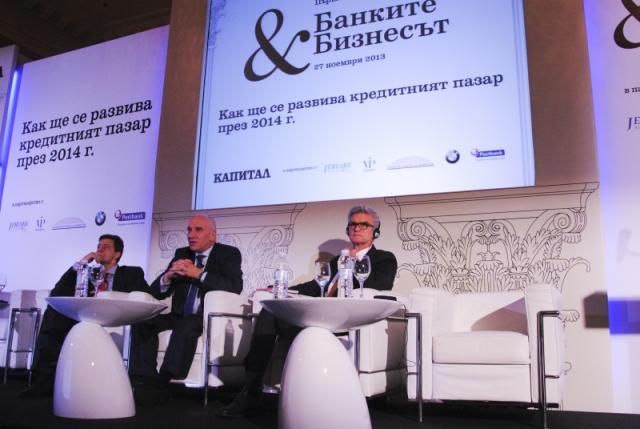Polina Spartyanova
The financial crisis has made the Bulgarian banks more demanding as regards the projects they choose to credit. This is the opinion of the participants in the first of its kind forum on "Banks and the Business" which aimed to outline the trends in the credit market in Bulgaria in 2014.
 "The success of a credited project is assessed on the basis of its scale and the sum for its funding, namely what amount of it will be secured by the bank and what amount by the investor," Elian Batinov, head of the Large Corporate Clients Department, formulates the experience of United Bulgarian Bank (UBB). In his opinion, it is very important that the bank and its client follow the same direction and cooperate in order for their joint project to yield better results. He also states that the bank has to offer its client additional details and information related to the project, which he has not taken into account in order for the client to be able to eliminate the errors in time and focus on the advantages of the project.
"The success of a credited project is assessed on the basis of its scale and the sum for its funding, namely what amount of it will be secured by the bank and what amount by the investor," Elian Batinov, head of the Large Corporate Clients Department, formulates the experience of United Bulgarian Bank (UBB). In his opinion, it is very important that the bank and its client follow the same direction and cooperate in order for their joint project to yield better results. He also states that the bank has to offer its client additional details and information related to the project, which he has not taken into account in order for the client to be able to eliminate the errors in time and focus on the advantages of the project.
Elian Batinov expresses confidence that each project that is well developed will receive the support of UBB, giving the example of the risk appetite of the financial institution since, even at this point, it would credit a project in the field of construction, although the sector is in stagnation, as long as it has been precisely developed. He states for GRReporter that the recapitalization of the National Bank of Greece has not affected the operation and development of UBB as it finances its operations entirely with resources accumulated in the local market.
 "Before the financial crisis the banks were not particularly demanding when considering business projects. Instead they relied more on the assessment that the losses would be in the range of between 10% and 20% if the profit were between 50% and 60%. However, after the impact of the crisis, the difference between the profit and the loss for the bank is between 10% and 20%, so both sides of the project have become more accurate. That is why the banks are now looking for higher returns on their loans and have set stricter criteria for the applicants," Angel Mateev, head of Small Business Banking Division at Postbank, presents the approaches of the financial institution to the credit projects before and after the crisis.
"Before the financial crisis the banks were not particularly demanding when considering business projects. Instead they relied more on the assessment that the losses would be in the range of between 10% and 20% if the profit were between 50% and 60%. However, after the impact of the crisis, the difference between the profit and the loss for the bank is between 10% and 20%, so both sides of the project have become more accurate. That is why the banks are now looking for higher returns on their loans and have set stricter criteria for the applicants," Angel Mateev, head of Small Business Banking Division at Postbank, presents the approaches of the financial institution to the credit projects before and after the crisis.
According to Mateev, it is crucial for the financial institutions to consider the investment project from start to finish and establish the amount that the client will secure since if the bank finances 100% of the project, then it is not clear if the client believes in the idea itself. "We grow with our customers. So we look for projects with better financial terms in comparison with the others," concludes the head of Small Business Banking Division at Postbank.
Asked by GRReporter, whether Eurobank is planning to sell its subsidiary bank in Bulgaria in compliance with the recommendations of Greece’s lenders, Angel Mateev withheld comment on the case since such decisions were not taken in Bulgaria.

Nikola Stoyanov, Team Leader, SME Department, Bulgarian Development Bank, also believes that the crisis has had a positive impact on some sectors. He gave the example of the tailoring industry in Bulgaria which, according to the latest data, has started to recover relatively rapidly and has been able to regain the trust of big fashion brands such as ZARA and Mango, which produce their clothes in Bulgaria. In addition, the Bulgarian tailoring industry can boast that it produces the clothes of world famous brands such as H & M and Hugo BOSS.
During the banking forum, Peter Andronov, Executive Director of CIBANK, said that the downward trend of the cost of financing would continue next year, thus enabling the Bulgarian banks to further reduce the interest rates on loans. According to him, the need for banks to accumulate deposits has drastically decreased, so the interest rates are gradually declining. Andronov paid attention to the political crisis in Bulgaria in 2013 and expressed his position that no political gain from the changes in the banking sector should be sought because this could harm both the activities of banks and economic growth.
The head of the regional business development team of the European Investment Fund, Hubert Cottogni, expressed concern over the political crisis in Bulgaria since, so far, the experience of the institution in the country has been positive. Cottogni also expressed satisfaction with the pace of the work of the programmes in Bulgaria, stressing that, on the one hand, this is due to the support of the governments and the financial institutions and, on the other, to the banks that serve the European programmes.